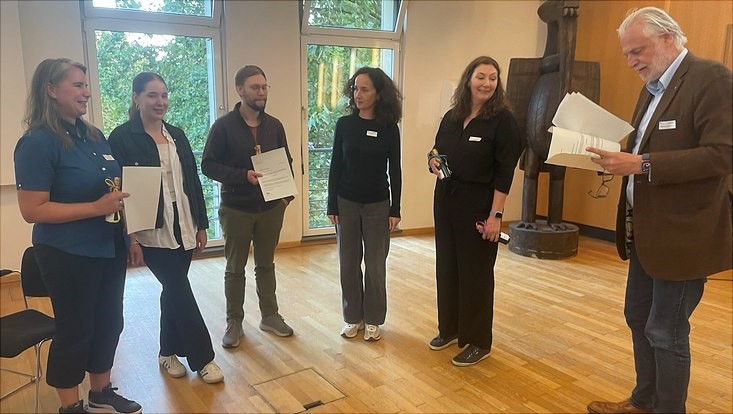Digitale Kommunikation
und Nachhaltigkeit
Foto: UHH/Denstorf
11. November 2024

Foto: UHH/Schatto-Eckrodt
Der Konferenzbeitrag "Classifying the needle in the haystack? Problemstellungen beim Einsatz von Argument-Mining für kommunikationswissenschaftliche Fragestellungen am Beispiel der Waffenlieferungsdebatte" wurde bei der diesjährigen Jahrestagung der DGPuK-Fachgruppe Methoden in Hamburg vom 18.–20. September mit dem Best Proposal Award ausgezeichnet. Die Autor*innen des Beitrags Prof. Dr. Katharina Kleinen-von Königslöw, Laura Liebig, Dr. Gerret von Nordheim, Jonas Rieger, Mattes Ruckdeschel, Dr. Gregor Wiedemann und Dr. Kostiantyn Yanchenko, die Teil des Projekts Few-Shot Learning für die Automatische Inhaltsanalyse der Kommunikationswissenschaft (FLACA) sind, beleuchten darin die methodischen Herausforderungen beim Einsatz von Argument-Mining in der Kommunikationswissenschaft.
Best Proposal Award for Argument-Mining Study on the Arms Supply Debate
The conference paper titled "Classifying the Needle in the Haystack? Challenges in Using Argument-Mining for Communication Research Questions Using the Example of the Arms Supply Debate" received a Best Proposal Award at this year’s annual conference of the DGPuK Methods Division, held in Hamburg from September 18-20. The authors of the paper, Prof. Dr. Katharina Kleinen-von Königslöw, Laura Liebig, Dr. Gerret von Nordheim, Jonas Rieger, Mattes Ruckdeschel, Dr. Gregor Wiedemann, and Dr. Kostiantyn Yanchenko, who are part of the project Few-shot learning for automatic content analysis in communication science (FLACA), examine the methodological challenges involved in applying argument-mining to communication science.